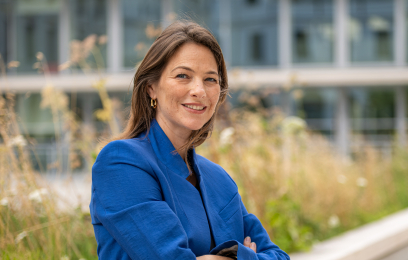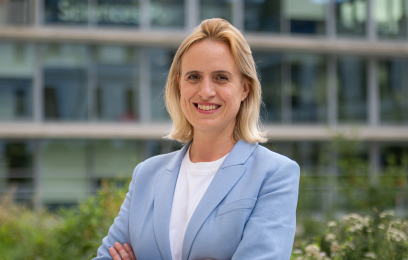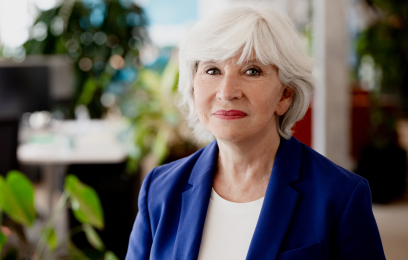Joint press release, CIVICA, March 2019
Building on already strong existing ties, seven world-leading institutions decide to further
unite to create the European University of Social Sciences. Through an alliance of both longterm
strategic goals and joint concrete activities that will benefit students, faculty, staff and
impact the broader public, CIVICA will prototype the university of tomorrow, it will generate
innovative solutions to the world's most pressing challenges inspired by the social sciences,
and it will promote European civic values.
Bocconi University (Italy), Central European University (Hungary), the European University Institute
(European Intergovernmental Organization), the Hertie School of Governance (Germany), the
National University of Political Studies and Public Administration (Romania), Sciences Po (France)
and the Stockholm School of Economics (Sweden) have submitted a joint application under the
name “CIVICA - The European University of Social Sciences” to become one of the pilot European
Universities in the first round of Erasmus+ applications in February 2019.
In a joint long-term mission statement, the seven Presidents recognize the special role of
European social sciences in generating solutions to the world’s most pressing challenges. CIVICA
embodies their ambition, as forward-thinking higher education institutions, to assume their civic
responsibility as Europeans towards the future European generations and towards the role of
Europe in the world:
“As world leading European institutions of social sciences, we are united in a unique mission: We
want to educate the next generation of professionals who serve their societies across sectors,
whose minds are concentrated on tackling the most pressing problems of the world, and who are
driven by values of democracy, respect and civic resilience”.
CIVICA aims to unite leading European higher education institutions in the social sciences, the
humanities, business management and public policy to form a broad European inter-university
campus that links teaching and learning, research and innovation, and society at large across
cultural, linguistic, and national borders. It will connect 38,000 students recruited from across
Europe and all over the world to a community of 7,000 faculty members and some 3,000
administrative staff. CIVICA will also be joined by the London School of Economics as an Associated
partner on many levels, and an ambitious set of activities will be dedicated to the international
attractiveness and competitiveness of the alliance.
Being able to build upon decades of successful partnerships amongst many of the partners, and
on the new complementarity sets of expertise that can be foreseen, the seven partners have a
unique capacity to engage in long-term joint strategic goals as well as immediate concrete action,
at all levels of their institutions. The more than 100-page long CIVICA project already provides the
frame for prototyping and testing operational trans-European activities for the emergence of a
European University. The proposal includes:
• The building of the physical and digital spaces and systems supporting a networked European
Campus for learning, knowledge production and application;
• At the Bachelor level, a multi-campus, interdisciplinary bachelor’s education experience with a
core focus on civic engagement;
• At the Masters level, a flagship multi-campus integrated course involving hundreds of students
in team-work across Europe and dozens of faculty to respond to contemporary European and
global challenges. Joint policy labs, incubators and capstone projects and hackathons with the
same objective of combining education, research and innovation while also contributing to
more European identity.
• At the Doctoral level, the emergence of an integrated European space for European Early Stage
Researchers in the Social Sciences and Humanities based on a trans-European hub for
mentoring and supervision
• Recognising the special role the social sciences must play in tackling global problems, four
dedicated multi-campus knowledge creating teams will be created to conduct results-oriented
joint work and feed in the three levels of the European campus: Challenges to Democracy in
the XXIst Century; Societies in Transition and Crises of Earth; Europe Revisited; and Data Driven
Technologies for the Social Sciences.
• CIVICA is to be an active agent in European society. Trans-European actions for civic
engagement and inclusion will include University for all Tours d'Europe, the promotion of
access to higher education for all and the Open learning initiative for refugees and asylum
seekers.
Through coordinated strategic planning, transformative governance and integrated activities,
including embedded mobility at all levels, joint and flexible curricula, a networked approach to the
students’ preparation for careers, civic commitment and hands-on societal outreach, CIVICA will
contribute to the international competitiveness of the partners of the alliance and the European
Higher Education Area and it will generate solutions to persistent European and world challenges.
CIVICA – the European University of Social Sciences is certainly formed at a momentous time in
European history; it shall strongly impact the future of Europe and the higher education sector
globally.
Press contacts
• Bocconi University: Tomaso Eridani: tomaso.eridani@unibocconi.it
• Central European University: Ildiko Rull, rullI@ceu.edu / +36 (1) 327 3800
• The European University Institute: Marco Incerti: Marco.Incerti@eui.eu / +39 055 4685 433
• The Hertie School of Governance: Nikolas von Hoffmann: hoffmann@hertie-school.org
• National University of Political Studies and Public Administration: Anca Goga:
anca.goga@snspa.ro / +40726.317.063
• Sciences Po (Main coordinator of CIVICA): Marie Frocrain: marie.frocrain@sciencespo.fr / +33
1 49 54 37 71
• The Stockholm School of Economics: Hanna Flodmark: hanna.flodmark@hhs.se

28.07.2025
JULIE KLEIN EST NOMMÉE DOYENNE DE L'ÉCOLE DE DROIT DE SCIENCES PO
Paris, le 18 juillet 2025 – Luis Vassy, directeur de Sciences Po, a nommé Julie Klein doyenne de l'École de droit. Elle succède à Sébastien Pimont.
Professeure des Universités à Sciences Po depuis 2020, Julie Klein dirige la spécialité « Entreprises, Marchés, Régulations » (EMR) du Master Droit économique. Juriste reconnue, elle est spécialiste du droit des obligations, du droit de la preuve et du droit économique. Elle siège au Conseil scientifique de Sciences Po, préside la section disciplinaire compétente à l'égard des étudiants, et assure la direction scientifique de la Semaine juridique – édition entreprise (JCP E).
Ses travaux interrogent les articulations entre droit civil et droit commercial. Elle contribue activement aux réflexions collectives sur l'évolution du droit, au sein de plusieurs groupes de travail pilotés par la Chancellerie ou le Haut Comité juridique de la place financière de Paris (HCJP), notamment sur la réforme du régime des obligations, le droit des sociétés ou les chambres internationales.
Luis Vassy, directeur de Sciences Po : « Julie Klein est une juriste et chercheuse d'exception investie depuis plusieurs années au sein de l'école de droit et au service de l'institution. À l'heure où les grands bouleversements du monde redessinent les contours du droit, elle portera avec ambition le projet de l'École. Je sais pouvoir compter sur sa vision, son engagement et son exigence intellectuelle pour continuer à porter l'école de droit de sciences po au plus haut niveau.
Je remercie Sébastien Pimont d'avoir assuré la croissance et le développement de l'école depuis cinq ans. Son mandat a été marqué par d'indéniables succès en France avec la réussite massive de nos étudiants dans toutes les professions juridiques, comme à l'étranger, ce dont témoigne l'attractivité croissante de l'école à l'international. »
Julie Klein, doyenne de l'École de droit de Sciences Po : « Je suis très honorée de ma nomination comme doyenne de l'Ecole de droit et remercie Luis Vassy pour sa confiance. L'École de droit de Sciences Po a su affirmer, grâce à mes prédécesseurs, une identité forte et innovante. Je souhaite développer cette dynamique, en consolidant son excellence scientifique, en renforçant les liens avec la pratique du droit, et en accompagnant les étudiants dans leur capacité à penser et exercer le droit dans un monde en transformation. »
Lire plus

